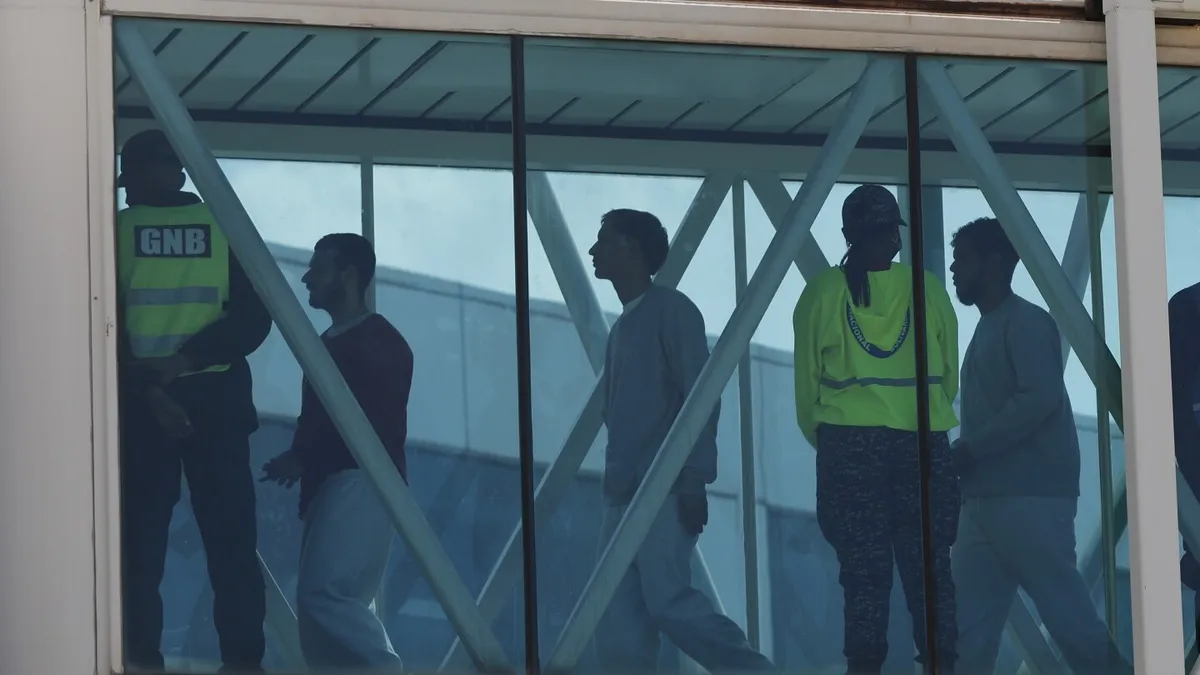
In a significant development, the Trump administration is celebrating a recent Supreme Court ruling that permits the resumption of deportations under the Alien Enemies Act. This ruling marks what the administration perceives as a major victory in the ongoing immigration battle, particularly concerning the deportation of Venezuelan migrants suspected of gang affiliations. President Donald Trump heralded the decision as a “GREAT DAY FOR JUSTICE IN AMERICA!” via social media, highlighting the administration's commitment to enforcing immigration laws.
The divided court concluded that President Trump could invoke this 18th-century wartime law to deport Venezuelan migrants accused of gang involvement to a notorious prison in El Salvador. However, the ruling also stipulates that individuals accused of being part of the Tren de Aragua gang must be granted an opportunity to contest their deportations. Legal representatives for these individuals have expressed that this aspect of the ruling is an “important victory” for due process.
Despite the ruling lifting a restraining order that previously halted deportations, it does not allow immediate deportations to commence. The court mandates that those accused must receive notice and sufficient time to present their cases before a judge, a requirement that could complicate the deportation process moving forward.
Families of those already deported under the Alien Enemies Act assert that their loved ones are not gang members and should not have faced deportation. The Attorney General, Pam Bondi, indicated expectations for future hearings to take place in Texas, emphasizing that judges will address each case on an individual basis rather than as a collective group. This approach aims to streamline the legal proceedings, but it also raises concerns about the challenges faced by individuals detained in various states, including New York, where a class-action lawsuit has been filed by the American Civil Liberties Union.
The ruling leaves many questions about the constitutionality of the Alien Enemies Act unanswered, particularly regarding the rights of migrants who argue they do not fall under the categories eligible for deportation. Moreover, there is uncertainty surrounding the more than 100 individuals who have already been deported to the El Salvador prison without the chance to challenge their removals in court, a right that the Supreme Court has now deemed necessary.
In a related case, Kilmar Abrego Garcia, a man mistakenly deported to the same prison, has become a focal point for legal discussions about deportation rights. His attorney has argued that the Supreme Court's ruling reinforces claims that his rights were violated, advocating for his return to the U.S.
Acting U.S. Immigration and Customs Enforcement director Todd Lyons stated that the administration is actively working to identify alleged gang members to be targeted for deportation under the Alien Enemies Act. However, he acknowledged the difficulty in pinpointing true affiliations, as gang membership often lacks formal identification. This complicates the process of substantiating claims against individuals marked for deportation.
At a recent Border Security Expo in Phoenix, Lyons maintained confidence that those targeted for deportation were rightly identified. Meanwhile, Deputy Customs and Border Protection Commissioner John Modlin received applause for his remarks on the administration's approach to sharing videos of deported migrants, which he described as a strategic communication effort.
This case has emerged as a contentious legal struggle for the Trump administration, reflecting broader tensions between executive power and judicial oversight. Trump has publicly called for the impeachment of judges involved in the case, prompting Chief Justice John Roberts to clarify that such actions are inappropriate responses to judicial disagreements. The ongoing scrutiny includes potential contempt proceedings against administration officials for allegedly ignoring court orders related to deportations.
As the legal landscape continues to evolve, the Supreme Court's recent ruling serves as a critical juncture in the Trump administration's immigration policy, with implications that will resonate well beyond the immediate context of Venezuelan migrants and the Alien Enemies Act.